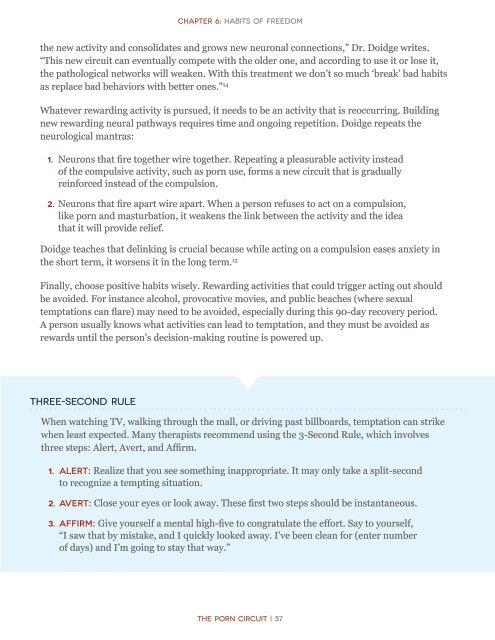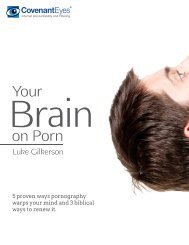The Porn Circuit | Covenant Eyes Internet Accountability and Filtering
The Porn Circuit | Covenant Eyes Internet Accountability and Filtering
The Porn Circuit | Covenant Eyes Internet Accountability and Filtering
You also want an ePaper? Increase the reach of your titles
YUMPU automatically turns print PDFs into web optimized ePapers that Google loves.
CHapter 6: Habits of Freedom<br />
the new activity <strong>and</strong> consolidates <strong>and</strong> grows new neuronal connections,” Dr. Doidge writes.<br />
“This new circuit can eventually compete with the older one, <strong>and</strong> according to use it or lose it,<br />
the pathological networks will weaken. With this treatment we don’t so much ‘break’ bad habits<br />
as replace bad behaviors with better ones.” 14<br />
Whatever rewarding activity is pursued, it needs to be an activity that is reoccurring. Building<br />
new rewarding neural pathways requires time <strong>and</strong> ongoing repetition. Doidge repeats the<br />
neurological mantras:<br />
1. Neurons that fire together wire together. Repeating a pleasurable activity instead<br />
of the compulsive activity, such as porn use, forms a new circuit that is gradually<br />
reinforced instead of the compulsion.<br />
2. Neurons that fire apart wire apart. When a person refuses to act on a compulsion,<br />
like porn <strong>and</strong> masturbation, it weakens the link between the activity <strong>and</strong> the idea<br />
that it will provide relief.<br />
Doidge teaches that delinking is crucial because while acting on a compulsion eases anxiety in<br />
the short term, it worsens it in the long term. 15<br />
Finally, choose positive habits wisely. Rewarding activities that could trigger acting out should<br />
be avoided. For instance alcohol, provocative movies, <strong>and</strong> public beaches (where sexual<br />
temptations can flare) may need to be avoided, especially during this 90-day recovery period.<br />
A person usually knows what activities can lead to temptation, <strong>and</strong> they must be avoided as<br />
rewards until the person’s decision-making routine is powered up.<br />
Three-Second Rule<br />
When watching TV, walking through the mall, or driving past billboards, temptation can strike<br />
when least expected. Many therapists recommend using the 3-Second Rule, which involves<br />
three steps: Alert, Avert, <strong>and</strong> Affirm.<br />
1. Alert: Realize that you see something inappropriate. It may only take a split-second<br />
to recognize a tempting situation.<br />
2. Avert: Close your eyes or look away. <strong>The</strong>se first two steps should be instantaneous.<br />
3. Affirm: Give yourself a mental high-five to congratulate the effort. Say to yourself,<br />
“I saw that by mistake, <strong>and</strong> I quickly looked away. I’ve been clean for (enter number<br />
of days) <strong>and</strong> I’m going to stay that way.”<br />
<strong>The</strong> <strong>Porn</strong> <strong>Circuit</strong> | 37




